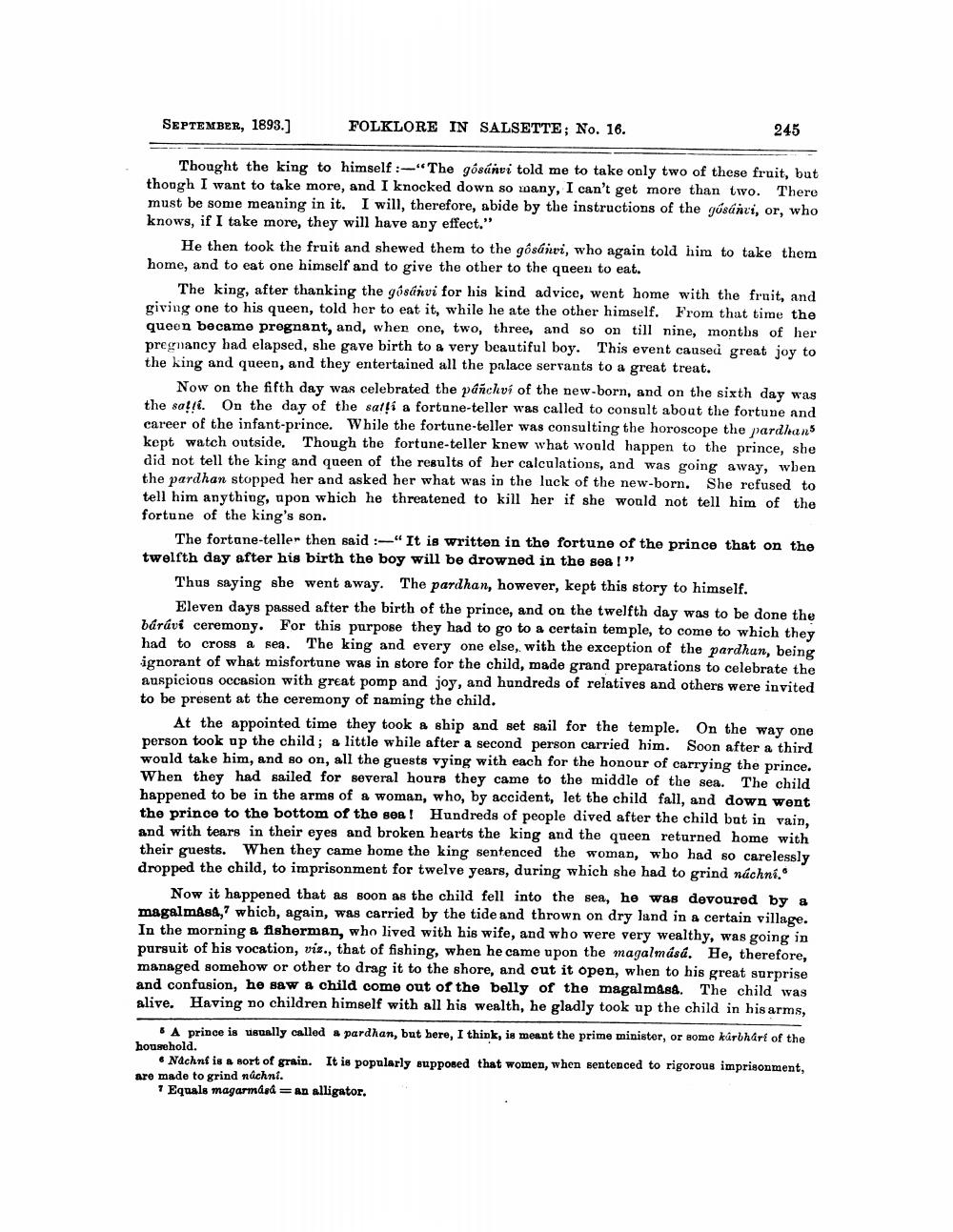________________
SEPTEMBER, 1893.]
FOLKLORE IN SALSETTE; No. 16.
245
Thought the king to himself :-"The gósánci told me to take only two of these fruit, but though I want to take more, and I knocked down so many, I can't get more than two. There must be some meaning in it. I will, therefore, abide by the instructions of the gúsánvi, or, who knows, if I take more, they will have any effect."
He then took the fruit and shewed them to the gôshiwi, who again told him to take them home, and to eat one himself and to give the other to the queen to eat.
The king, after thanking the gásávvi for his kind advice, went home with the fruit, and giving one to his queen, told her to eat it, while he ate the other himself. From that time the queen became pregnant, and, when one, two, three, and so on till nine, months of her pregnancy had elapsed, she gave birth to a very beautiful boy. This event caused great joy to the king and queen, and they entertained all the palace servants to a great treat.
Now on the fifth day was celebrated the pánchví of the new-born, and on the sixth day was the sall. On the day of the salli a fortune-teller was called to consult about the fortune and career of the infant-prince. While the fortune-teller was consulting the horoscope the pardhans kept watch outside. Though the fortune-teller knew what would happen to the prince, she did not tell the king and queen of the results of her calculations, and was going away, wben the pardhan stopped her and asked her what was in the luck of the new-born. She refused to tell him anything, apon which he threatened to kill her if she would not tell him of the fortune of the king's son.
The fortune-teller then said :-" It is written in the fortune of the prince that on the twelfth day after his birth the boy will be drowned in the sea!”
Thus saying she went away. The pardhan, however, kept this story to himself.
Eleven days passed after the birth of the prince, and on the twelfth day was to be done the báráví ceremony. For this purpose they had to go to a certain temple, to come to which they had to cross a sea. The king and every one else, with the exception of the pardhan, being ignorant of what misfortune was in store for the child, made grand preparations to celebrate the auspicious occasion with great pomp and joy, and hundreds of relatives and others were invited to be present at the ceremony of naming the child.
At the appointed time they took a ship and set sail for the temple. On the way one person took up the child; a little while after a second person carried him. Soon after a third would take him, and so on, all the guests vying with each for the honour of carrying the prince. When they had sailed for several hours they came to the middle of the sea. The child happened to be in the arms of a woman, who, by accident, let the child fall, and down went the prince to the bottom of the sea ! Hundreds of people dived after the child but in vain, and with tears in their eyes and broken hearts the king and the queen returned home with their guests. When they came home the king sentenced the woman, who had so carelessly dropped the child, to imprisonment for twelve years, during which she had to grind náchni.
Now it happened that as soon as the child fell into the sea, he was devoured by a magalmAsa,which, again, was carried by the tide and thrown on dry land in a certain village. In the morning & fisherman, who lived with his wife, and who were very wealthy, was going in pursuit of his vocation, vis., that of fishing, when he came upon the magalmásá. He, therefore, managed somehow or other to drag it to the shore, and cut it open, when to his great surprise and confusion, he saw a child come out of the belly of the magalmasa. The child was alive. Having no children himself with all his wealth, he gladly took up the child in his arms,
SA prince is usually called apardhan, but here, I think, is meant the prime minister, or some kúrbhart of the household.
• Nachní is a sort of grain. It is popularly supposed that women, when sentenced to rigorous imprisonment, are made to grind nächni.
1 Equals magarmasi = an alligator.




